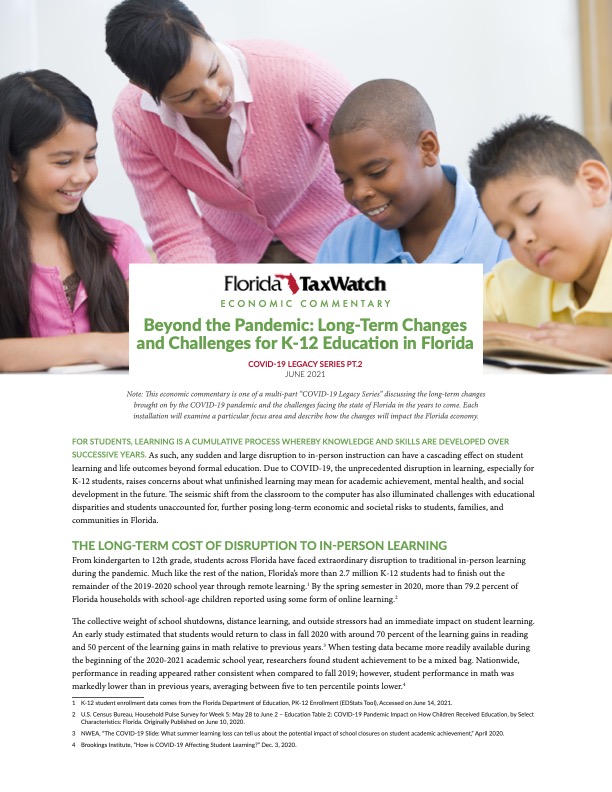Beyond the Pandemic: Long-Term Changes and Challenges for K-12 Education in Florida
 From kindergarten to 12th grade, students across Florida have faced extraordinary disruption to traditional in-person learning during the pandemic. Much like the rest of the nation, Florida’s more than 2.7 million K-12 students had to finish out the remainder of the 2019-2020 school year through remote learning. By the spring semester in 2020, more than 79.2 percent of Florida households with school-age children reported using some form of online learning.
From kindergarten to 12th grade, students across Florida have faced extraordinary disruption to traditional in-person learning during the pandemic. Much like the rest of the nation, Florida’s more than 2.7 million K-12 students had to finish out the remainder of the 2019-2020 school year through remote learning. By the spring semester in 2020, more than 79.2 percent of Florida households with school-age children reported using some form of online learning.
The collective weight of school shutdowns, distance learning, and outside stressors had an immediate impact on student learning. An early study estimated that students would return to class in fall 2020 with around 70 percent of the learning gains in reading and 50 percent of the learning gains in math relative to previous years. When testing data became more readily available during the beginning of the 2020-2021 academic school year, researchers found student achievement to be a mixed bag. Nationwide, performance in reading appeared rather consistent when compared to fall 2019; however, student performance in math was markedly lower than in previous years, averaging between five to ten percentile points lower.
Supplementing this finding, national exam data from Curriculum Associates, which included Florida students in the sample, found the percentage of students ready for grade-level work declined during the 2020-2021 school year by an average of 9.1 percentage points for math and 4.8 percentage points for reading. Concurrently, the percentage of students learning below-grade level increased during the 2020-2021 school year, especially in math. Unfinished learning was particularly pronounced for students in grades 3-5 where the percentage of students on grade level for math was around 13 percentage points lower. Findings in Florida paralleled national trends. In Miami-Dade County, for example, the state’s largest school district, officials reported that around 43 percent of students tested in pre-K to third grade were below grade level in reading and around 54 percent of students were below grade level in math.
Unfinished student learning in the short-run, if not made up for, can potentially turn into long-term economic losses. Learning disruptions can lower lifetime educational attainment, affecting employability and productivity. According to the Federal Reserve Bank of San Francisco, by 2045, there may be a 2.7 percent decrease in the number of college-educated workers ages 29 to 39 due to education disruptions in 2020. Studies vary in their economic forecasts, suggesting students’ lifetime earnings may fall anywhere from $16,000 to $82,000 (in 2020 dollars) depending on the magnitude of learning disruptions. In aggregate, this equates to more than $173 billion in U.S. Gross Domestic Product (GDP) losses by 2040, absent any efforts to accelerate learning. It should be emphasized that these forecasts are rough estimates and can be greatly reduced by concerted efforts to address unfinished learning during the present.